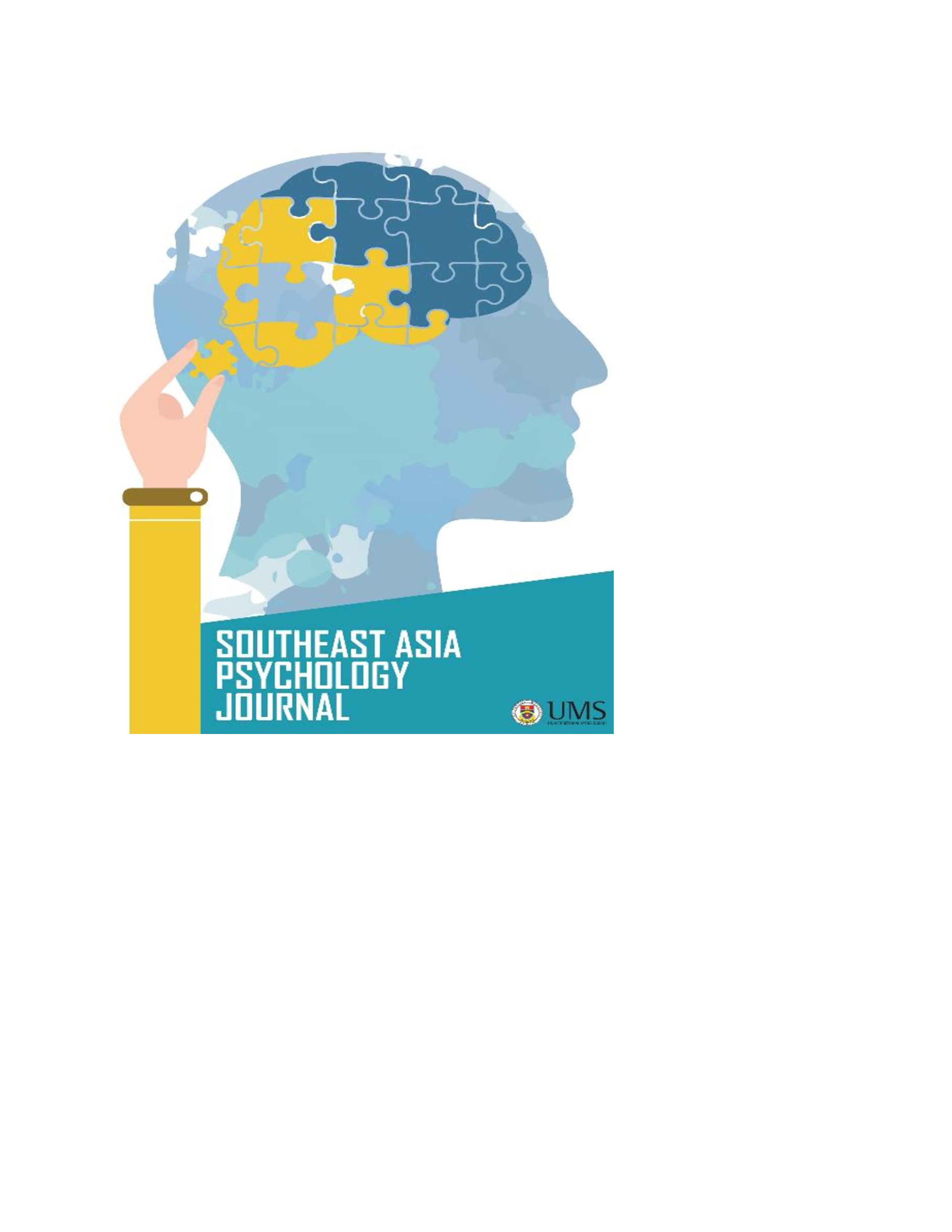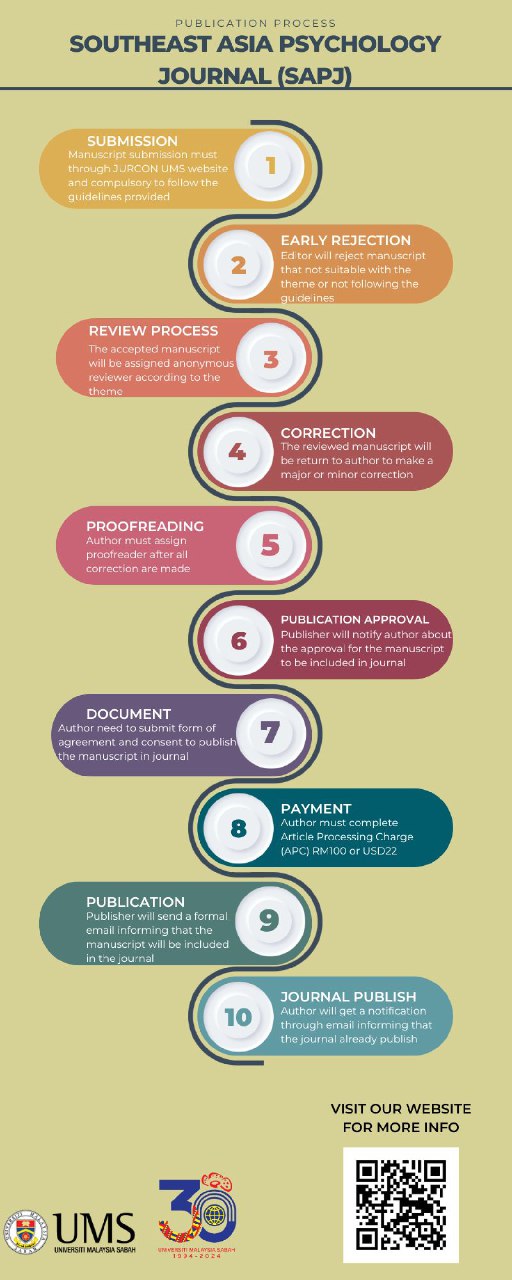THE DIFFERENCES IN GENDER AND EDUCATION LEVEL ON MENTAL HEALTH LITERACY AMONG YOUTHS IN MALAYSIA
DOI:
https://doi.org/10.51200/sapj.v11i2.4909Keywords:
Gender, Education level, Mental Health Literacy, Youth, MalaysiaAbstract
This quantitative study investigated mental health literacy (MHL) among Malaysian youth, considering gender and education level. A sample of 134 youths aged 15-30 from different regions in Malaysia participated, with 43 males and 91 females. Data were collected using a Google Form, assessing demographic background and MHL components. This study utilises random sampling as its sampling method. The assessment of mental health literacy was conducted using a formal standardised questionnaire. Data analysis was conducted using SPSS version 27, utilising descriptive statistics and one-way ANOVA. Results indicated no significant gender difference in MHL, but a significant relationship between education level and MHL. The study comprehensively examines how gender and education level influence mental health literacy among Malaysian youth, identifying challenges and disparities. Future research should explore socio-cultural influences and develop targeted interventions to improve mental health knowledge among youth with lower education levels. Policymakers and educators can use these findings to support the mental health needs of Malaysian youth, enhancing overall well-being.
References
Angermeyer, M. C., Holzinger, A., & Matschinger, H. (2009). Mental health literacy and attitude towards people with mental illness: A trend analysis based on population surveys in the eastern part of Germany. European Psychiatry, 24(2), 225-232.10.1016/j.eurpsy.2008.06.010
Cotton, S. M., Wright, A., Harris, M. G., Form, A. J., & McGorry, P. D. (2006). Influence of gender on mental health literacy in young Australians. Australian and New Zealand Journal of Psychiatry, 40(9), 790-796. 10.1080/j.1440-1614.2006.01885.x.
Gorczynski, P., & Sims-Schouten, W. (2022). Evaluating mental health literacy amongst US college students: A cross sectional study. Journal of American College Health, 1-4. https://doi.org/10.1080/07448481.2022.2063690
Hadjimina, E., & Furnham, A. (2017). Influence of age and gender on mental health literacy of anxiety disorders. Psychiatry Research, 251, 8-13.https://doi.org/10.1016/j.psychres.2017.01.089
Hunn, L., Teague, B., & Fisher, P. (2023). Literacy and mental health across the globe: A systematic review. Mental Health and Social Inclusi. https://doi.org/10.1108/MHSI09-2022-0064
Ines, J. (2019). Filipino college students' mental health literacy. 12th DLSU Arts Congress De La Salle University Conference Proceedings.
Jorm, A. F., Korten, A. E., Jacomb, P. A., Christensen, H., Rodgers, B., & Pollitt, P. (1997). Mental health literacy: A survey of the public's ability to recognise mental disorders and their beliefs about the effectiveness of treatment. The Medical journal of Australia, 166(4), 182–186. https://doi.org/10.5694/j.1326-5377.1997.tb140071.x
Kaneko, Y., & Motohashi, Y. (2007). Male gender and low education with poor mental health literacy: A population-based study. Journal of Epidemiology, 17(4), 114-119.10.2188/jea.17.114
Kutcher, S., Wei, Y., & Coniglio, C. (2016). Mental health literacy: Past, present, and future. The Canadian Journal of Psychiatry, 61(3), 154-158. https://doi.org/10.1177/070674371561660
Lauber, C., -Gross, V. A., Fritschi, N., Stulz, N., & Rössler, W. (2005). Mental health literacy in an educational elite – an online survey among university students. BMC Public Health, 5(44). 10.1186/1471-2458-5-44
Lee, H. Y., Hwang, J., Ball, J. G., Lee, J., Yu, Y., & Albright, D. L. (2020). Mental health literacy affects mental health attitude: Is there a gender difference? American Journal of Health Behavior, 44(3), 282-291. https://doi.org/10.5993/AJHB.44.3.1
Lee, J. E., Goh, M. L., & Yeo, S. F. (2023). Mental health awareness of secondary schools students: Mediating roles of knowledge on mental health, knowledge on professional help, and attitude towards mental health. Heliyon, 9(3), e14512. 10.1016/j.heliyon.2023.e14512
Leighton, S. (2010). Using a vignette-based questionnaire to explore adolescents' understanding of mental health issues. Clinical Child Psychology and Psychiatry, 15(2). https://doi.org/10.1177/1359104509340234
Mansfield, R., Humphrey, N., & Patalay, P. (2021). Educators’ perceived mental health literacy and capacity to support students’ mental health:associations with school-level characteristics and provision in England. Health Promotion International, 36(6), 1-12.10.1093/heapro/daab010
Marcus, M., & Westra, H. (2012). Mental health literacy in Canadian young adults: Results of a national survey. Canadian Journal of Community Mental Health, 31(1). 103.26.196.10 on 07/05/23
Martínez-Mesa, J., González-Chica, D. A., Bastos, J. L., Bonamigo, R. R., & Duquia, R. P. (2014). Sample size: How many participants do I need in my research? Anais Brasileiros de Dermatologia, 89(4), 609-615. 10.1590/abd1806-4841.20143705
Mendenhall, A. N., & Frauenholtz, S. (2013). Mental health literacy: Social work's role in improving public mental health. Social Work, 58(4), 365-368. https://doi.org/10.1093/sw/swt038
Miles, R., Rabin, L., Krishnan, A., Grandoit, E., & Kloskowski, K. (2020). Mental health literacy in a diverse sample of undergraduate students: demographic, psychological, and academic correlates. BMC Public Health, 20(1699). https://doi.org/10.1186/s12889-020-09696-0
Office of the Surgeon General (OSG). (2021). We can take action. In Protecting Youth Mental Health: The U.S. Surgeon General’s Advisory. US Department of Health and Human Services.
Ogorchukwu, J. M., Sekaran, V. C., Nair, S., & Ashok, L. (2016). Mental health literacy among late adolescents in South India: What they know and what attitudes drive them. Indian Journal of Psychological Medicine, 38(3), 234-241. 10.4103/02537176.183092
Oliveira, A. P., Nobre, J. R., Luis, H., Luis, L. S., -Riobóo, N. A., Pinho, L. G., & Sequeira, C. (2022). Literacy and mental health of Portuguese higher education students and their use of health promotion strategies during confinement in the COVID-19 pandemic. International Journal of Environmental Research and Public Health, 19(21), 14393. https://doi.org/10.3390/ijerph192114393
Reavley, N. J., mcCann, T. V., & Jorm, A. F. (2011). Mental health literacy in higher education students. Early Intervention in Psychiatry, 6(1), 45-52. https://doi.org/10.1111/j.1751- 7893.2011.00314.x
Sampaio, F., Gonçalves, P., & Sequeira, C. (2022). Mental health literacy: It is now time to put knowledge into practice. International Journal of Environmental Research and Public Health, 19(12), 7030. https://doi.org/10.3390/ijerph19127030
Singh, S., Zaki, R. A., Farid, N. D. N., & Kaur, K. (2022). The determinants of mental health literacy among youth adolescents in Malaysia. International Journal of Environmental Research and Public Health, 19(6), 3242. 10.3390/ijerph19063242
Taber, K. S. (2018). The Use of Cronbach’s Alpha When Developing and Reporting Research Instruments in Science Education. Research in Science Education, 48, 1273-1296. https://doi.org/10.1007/s11165-016-9602-2
Tambling, R. R., D’Aniello, C., & Russell, B. S. (2023). Mental health literacy: A critical target for narrowing racial disparities in behavioral health. International Journal of Mental Health and Addiction, 21, 1867-1881. 10.1007/s11469-021-00694-w
Tully, L. (2019). Child mental health literacy: What is it and why is it important? Emerging Minds. https://emergingminds.com.au/resources/child-mental-health-literacy-what-is-it-and-why-is- it-important/
United Nations Department of Economic and Social Affairs. (n.d.). United Nations Youth [Definition of youth]. https://www.un.org/esa/socdev/documents/youth/factsheets/youth-definition.pdf
Wan, C. D., Sirat, M., & Razak, D. A. (2018). Education in Malaysia towards a developed nation. ISEAS Yusof Ishak Institute.
Yunus, A., & Landau, E. (2019, July). 'Youth' now defined as those between 15 and 30. New Straits Times. https://www.nst.com.my/news/nation/2019/07/501288/youth-now-defined-those- between-15-and-30








